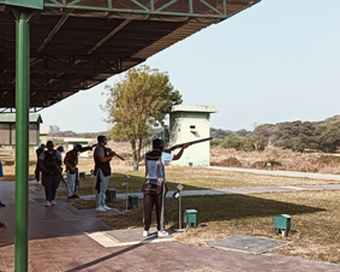 PM Modi visit USA
PM Modi visit USA Only the mirror in my washroom and phone gallery see the crazy me : Sara Khan
Only the mirror in my washroom and phone gallery see the crazy me : Sara Khan Karnataka rain fury: Photos of flooded streets, uprooted trees
Karnataka rain fury: Photos of flooded streets, uprooted trees Cannes 2022: Deepika Padukone stuns at the French Riviera in Sabyasachi outfit
Cannes 2022: Deepika Padukone stuns at the French Riviera in Sabyasachi outfit Ranbir Kapoor And Alia Bhatt's Wedding Pics - Sealed With A Kiss
Ranbir Kapoor And Alia Bhatt's Wedding Pics - Sealed With A Kiss Oscars 2022: Every Academy Award Winner
Oscars 2022: Every Academy Award Winner Shane Warne (1969-2022): Australian cricket legend's life in pictures
Shane Warne (1969-2022): Australian cricket legend's life in pictures Photos: What Russia's invasion of Ukraine looks like on the ground
Photos: What Russia's invasion of Ukraine looks like on the ground Lata Mangeshkar (1929-2022): A pictorial tribute to the 'Nightingale of India'
Lata Mangeshkar (1929-2022): A pictorial tribute to the 'Nightingale of India' PM Modi unveils 216-feet tall Statue of Equality in Hyderabad (PHOTOS)
PM Modi unveils 216-feet tall Statue of Equality in Hyderabad (PHOTOS)India Open Competition in Shotgun, organised by the National Rifle Association of India (N
- Hockey India names Amir Ali-led 20-man team for Junior Asia Cup
- Harmanpreet Singh named FIH Player of the Year, PR Sreejesh gets best goalkeeper award
- World Boxing medallist Gaurav Bidhuri to flag off 'Delhi Against Drugs' movement on Nov 17
- U23 World Wrestling Championship: Chirag Chikkara wins gold as India end campaign with nine medals
- FIFA president Infantino confirms at least 9 African teams for the 2026 World Cup
India, US, Japan, Australia hold first quad talks on Indo-Pacific cooperation Last Updated : 12 Nov 2017 05:11:08 PM IST 
(Fils Photo)
India, Australia, Japan and the US on Sunday agreed that "a free, open, prosperous and inclusive" Indo-Pacific served long-term global interests, giving impetus to an emerging quad of democracies amid Chinas rising military and economic power.
It was the first dialogue of the quadrilateral formation of the democracies in which anti-terrorism cooperation was also discussed.
An External Affairs Ministry statement in New Delhi said foreign officials from India, Australia, Japan and the US met in the Philippines capital and held consultations "on issues of common interest in the Indo-Pacific region".
"The discussions focused on cooperation based on their converging vision and values for promotion of peace, stability and prosperity in an increasingly inter-connected region that they share with each other and with other partners," the statement said.
"They agreed that a free, open, prosperous and inclusive Indo-Pacific region serves the long-term interests of all countries in the region and of the world at large."
The officials also exchanged views on addressing common challenges of terrorism and proliferation linkages impacting the region as well as on enhancing connectivity.
Indian officials highlighted India's Act East Policy as the cornerstone of its engagement in the region.
The four countries are working to revive their quadrilateral dialogue.
The meeting was held as Prime Minister Narendra Modi arrived in Manila on Sunday on a three-day visit to the Philippines for the 15th India-Association of Southeast Asian Nations (Asean) meet and the 12th East Asia Summit on Tuesday.
The Association of Southeast Asian Nations (Asean), comprising Brunei, Cambodia, Indonesia, Laos, Malaysia, Myanmar, the Philippines, Singapore, Thailand and Vietnam, has emerged as a key cornerstone of New Delhi's foreign policy, with its Look East Policy, launched by then Prime Minister P.V. Narasimha Rao in 1992.
The Modi government has turned it into the Act East Policy to focus on increased engagements with the regional bloc.
The annual East Asia Summit is held by leaders of the Asean countries and those of Australia, China, India, Japan, New Zealand, Russia, South Korea and the US.
Even as India, the US and Japan have a trilateral dialogue mechanism in place for issues relating to the Indo-Pacific region, Japanese Foreign Minister Tara Kono said in October that Tokyo was for a top-level quadrilateral dialogue that would also include Australia.
Kono said the idea was for the leaders of the four countries to promote free trade and defence cooperation across a stretch of ocean from the South China Sea, the Indian Ocean and all the way to Africa.
The emerging quadrilateral is seen to counter China's aggressive maritime expansion under its Belt and Road initiative. China's plans would cement a sphere of influence for Beijing well beyond Asia.
India responded to Kono's comments by saying that New Delhi was open to work with like-minded countries that advance India's interests.
IANS For Latest Updates Please-
Join us on
Follow us on








172.31.16.186







